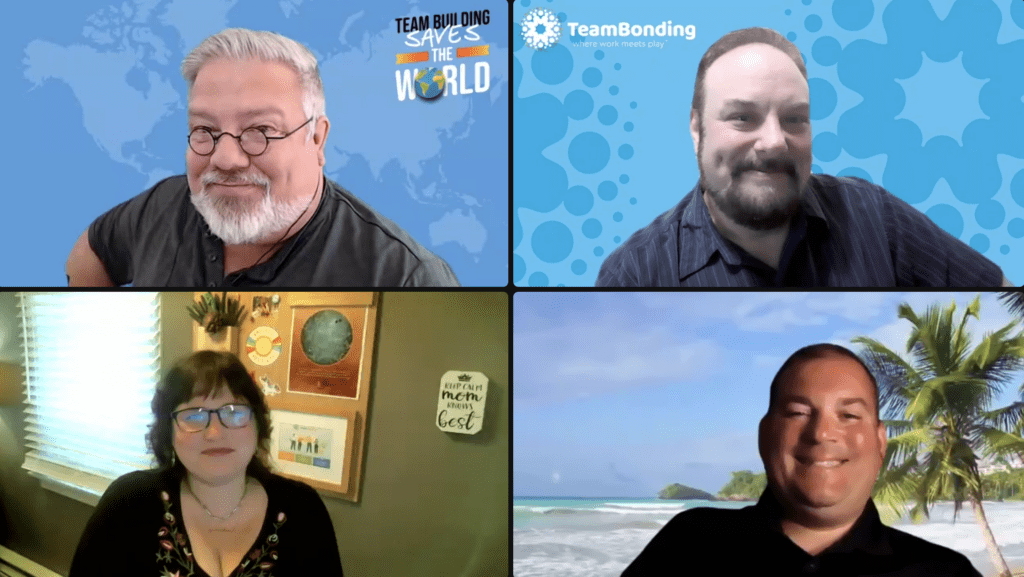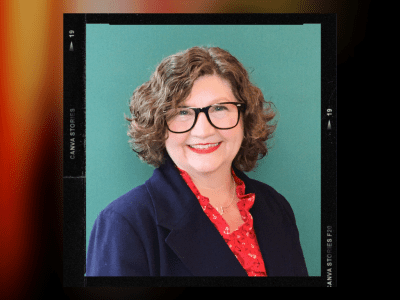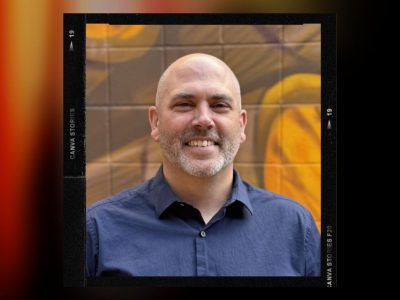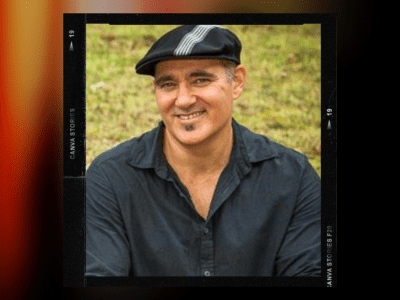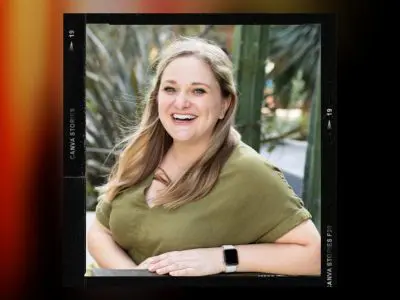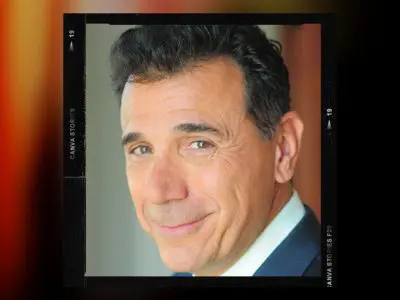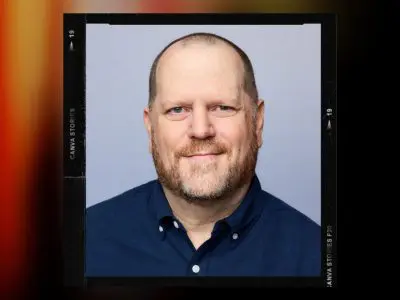Level Up Your Team: Team Building Tips From The Pros
w/ Shannon DuPont, Paul Giroux, and Christian Galpin
Use the buttons above to listen now.
Transcript - Level Up Your Team: Team Building Tips From The Pros
Rich: On this episode of Team Building saves the world.
Shannon: This one feels like it was just for you, just this one time. I think that’s kind
Christian: right. Not a cookie cutter experience, it’s something that’s more, we did not receive a script for this podcast.
Paul: I can’t believe that we did that. When I came in here, I was like, what am I doing here now?
I don’t wanna stop. And people said, you know, make coffee. You know, increase their pay. So those are the big things people want at work.
Shannon: Not a single one was Correct? Not one I started going in. I was fact checking and
Christian: not everything on the internet is right.
Rich: The drum.
Hello team. It’s me, your old friend, rich Rininsland host of team building saves the world, the show where I speak to thought leaders from around the world discussing variable strategies and tools to help you and your team build a better work environment. And today we’re taking a look at the impact of team building with some of the experts from team bonding, Shannon DuPont, Paul Giroux and Christian Galpin.
The first I need to share some love with the rest of my supporters at team bonding if your team is ready to experience teamwork to the power of play, then visit team bonding.com to learn more. And now team, join me in welcoming my guests, the director of program development, Shannon DuPont, lead facilitator, Christian Galpin and longtime friend of the show, the Godfather of Game shows himself, Paul Giroux.
Hey gang.
Welcome everybody. So good to have you guys join us. Thank you so much. Especially Shannon and Christian. I mean, we’ve known each other forever. And this is the first time I’ve had you guys on the podcast. Thanks for coming.
Christian: You’re very welcome. Thank you for having us. It’s been what? It only took four years.
Rich: I know.
Shannon: Without telling.
Rich: Now I think counting Christian. I think now Christian, you finally have something to say.
Christian: I’ve been waiting. I’ve been waiting.
Rich: Well, let’s start off, Shannon. Uh, can you please tell us everybody what it is that you do for team bonding as the director of programs?
Shannon: Sure. Um, so what I do is I’m sort of the master of all of our programming and events, so any new programs that we’re bringing on board, I am responsible for making sure we have all the information.
I’m often responsible for actually creating those new programs. I’m responsible for training the facilitation staff, the event management staff, and the sales team, uh, on how to sell and produce those types of events. Any existing events and programs that we have, I also consider my responsibility, and so I’m often updating things and bringing old events into like the new age of digital technology and just kind of providing fresh ideas for the company and for our clients that come back again and again and are looking for new experiences.
Rich: Hmm. And Paul, what about you? Uh,
Paul: I, uh, get to host events. That’s, uh, number one, always facilitating. And then, uh, I get to help Shannon sometimes with coming up with new ideas how to deliver and looking at, you know, groups of 50 versus you know, a hundred, 200, 300. And then they say, can we do it for 800? Uh, and then, uh, just overseeing the facilitators around the country, making sure they have what they need when they have questions or, Hey, I have this coming up, how do we handle that situation?
You know, this is an interesting ask from a client. What do we do here? So just kind of, uh, supporting everyone out there.
Rich: So Christian, you and I are both lead facilitators. We’ve done pretty much the same job for quite a while now, but can you explain to everybody your point of view? What is a lead facilitator?
Christian: Excellent. Uh, thank you. Uh, so. We’re the liaison, uh, in actual, well in these days, live and virtual events. It used to be able to just say, to be there on site. In fact, I’m gonna make a conscious effort right now to talk more slowly because of the people listening or anything like me, they’re listening to this on at least one and a half, if not double speed wherever they are, because.
That’s what I do. So I’m gonna talk a little more slowly than I normally would. But yeah, we’re the ones who go onsite, break down the event for the people so that they know what they’re gonna be doing. A lot of times, uh, when we show up, only the client contact is aware of the specifics of what we’re gonna do.
So we have to lay out for the people what’s gonna happen in our team building event, uh, or murder mystery for doing one of those. And then actually, Make that happen, give them the best experience possible for their ultimate outcome. Whether it be, as we’re talking about today, just to have fun or to find some, uh, specific professional development aspects.
Rich: So one of the things about this season that we’ve noticed so far, uh, my producer, Anna and I, as we’ve been talking to guests, and we’re about a third of the way through the season already, we’re starting to notice a realization that life has shifted from the corporate world being more towards the worker and now it’s swinging back towards the corporate side as if the worker has gotten what they wanted because of the pandemic, and now it’s time for the corporations to start to take control again.
So interesting how important channel, let’s start with you. How important is it to keep team building in mind and corporate culture for these corporations?
Shannon: I think it’s extremely important. I think that any company that’s gonna be really successful needs to have a collective group of people with a shared purpose working together in an effective way.
And it’s easy to come up to roadblocks of that, where you have issues, uh, where there’s a merger where, like you just said, there’s a shift from being kind of more focused on the workers to back towards like the leadership and the corporate thing. Mm-hmm. That creates a great need for. Acknowledgement that there is a transition process of, of making a conscious attempt to communicate with each other better, to have some fun with each other, to get to know each other a little bit better.
Those are things that may not seem like they directly affect your day-to-day operations within a corporation. Right. But they do, because they create a good environment behind the scenes where people know each other and they respect each other, and they have that, that ability to communicate in a, a clear and concise way.
And I think that team building is one of the best tools that you can use to help give you that sense of community within your company.
Rich: Well, how many different types of programs are we even talking about? Like, like what is the number we offer?
Shannon: I don’t know the exact number, but it is over 100 programs,
Rich: and that is both live and virtual.
Shannon: That is combined live and virtual? Yes. Okay. And some of the programs are overlapping, so we have a virtual version and a live version, and sometimes even a hybrid version, but there’s a lot of them.
Rich: And what about, uh, being specific for company needs? Like if, if the corporation thinks that they have something very specific that they’re looking to launch or to, uh, applaud their corporation for, or just goals that their employees are focused on.
Are we able to meet that for them?
Shannon: Absolutely on numerous levels. So initially they come into the sales team, and the sales team really works with all the clients to understand, you know, how many people, where’s it gonna be, what is your goal? What is it that you’re hoping to walk away from this experience with?
What are the lasting, you know, tangible effects that you wanna take home with you? And then we find a program that will best suit those needs that they’re expressing to us. The fact that we have so many programs to choose from means that they are all targeted towards different kind of goals. So it’s easy for us to pair them with the right program.
And then once they’re paired with the right program, they come to the event management department and the event managers work with them really hand in hand to further customize those experiences and bring in their messaging, you know, custom trivia questions, just ways to make it feel like even though this is a program that we’ve done thousands of times for hundreds of clients, this one feels like it was just for you, just this one time.
I think that’s kind of
Christian: Right. Not a cookie cutter experience. Exactly. It’s something that’s more focused on them. Exactly. Yeah.
Rich: Christian, you’ve been there in the forefront with these things, and I’m sure over the years, just like me, you’ve gotten those notes where it’s like they’re looking to focus on this, this, and this.
How hard is that to pivot,
or how easy is it to pivot?
Christian: I think it’s relatively easy to pivot. I think a lot of times people are really looking for the same things. They might think it’s unique to them. Mm-hmm. Uh, because everyone’s experience is unique to them, and every corporation feels like they’re the, but everyone needs the same basic elements of communication and cooperation.
There might be a specific goal that they have in mind. A lot of times. You were talking about, uh, switching over from a focus on. The workers to the, to the leadership. Right. And I have seen that, uh, and, and I think this is more throughout, although I think the, one of the things that the pandemic changed was the need for team building is even more aggressive now because you don’t, the workers are so scattered.
A lot of people haven’t fully returned to the office. Uh, and a lot of people saw, especially with the virtual events, the ability for these organizations that were already scattered. All across the country to be able to have a way to interact and get to know each other. And that’s why, you know, the virtual events are still continuing, right?
Uh, and still so popular even after the fact that we have the ability now to, you know, have everyone in a large physical group. There’s still a, a real benefit to the virtual events. But again, The leadership I find have really focused a lot more on doing the team building for themselves, for their leadership conferences and things like that to try to get more communication and more collaboration skills and, you know, skill sets in their own group.
And I find that. When we go in and there’s a specific goal in mind, it’s easy enough to, to, as Shannon said, these events that they’ve already, you know, pigeonholed down Yeah. Are designed for that to begin with. And it’s real easy to kind of debrief on an element that’s important to them by just taking aspects of what we’ve done and kind of
just bringing their awareness to it. I mean, some of the events like the Team Prov Event, um, that I love doing is very specifically about all of those elements about, you know, creating these environments for people to think more broadly, think more creatively, and collaborate and communicate, uh, which is I think most people’s main goals when they get into this.
But also, and, and this is the other benefit of, I think what Team Bonding does is that focus on fun is always there. Uh, we’re talking about like, you know, the people who want like a specific outcome versus just chilling and relaxing. But I think no matter, like I said, I think everyone wants to have a certain kind of outcome where people feel like they’ve, um, you know, picked up new skills and gained a better understanding of one another, but they also want to have fun.
I think that, uh, You know, they’ve got, uh, usually a couple of days of conferences or meetings that are, you know, they’re, they’re getting this information just, you know, pounded at them, pounded at them. They want another way for them to approach that information. That’s a little more palatable, a little more enjoyable.
And that’s what we provide.
Rich: What, uh, for my team out there who’s listening who may not know what, what it would me mean when we say Team Prov, what actually isn’t?
Christian: Oh, that’s one of the, uh, we have several different, uh, improvisation team building events. Team Prov is the one that’s more focused on kind of a corporate level.
Mm-hmm. Uh, applied improv, I think is, uh, the term that we use here at Team Bonding, but I’ve been doing improv comedy shows and improv training for a long time. I’m not as young as I look, and I don’t look young, so. So, yeah, so it’s just, uh, taking the concepts that apply to improv comedy and relating them to the corporate world.
Things about making distinct statements, uh, being creative, accepting the reality of what is around you and the reality that’s being created to you by the comments that other people are making, building off of other people’s ideas, enjoying yourself. Staying focused, keeping up with a good tempo, either at work or in your speech or in your communication.
Mm-hmm. And, you know, having an element of trusting in yourself and in your partners, uh, and all those aspects of things that we teach in improv comedy, but that relate to, you know, to life in general and specifically to corporate events and corporate life as they’re moving through, uh, through business.
And it’s something that people don’t necessarily think about this. You know, one of the things I talk about at the beginning of any, uh, improv workshop or a team improv is that we all improvise every day. Like, uh, it may sound like it when Shannon’s answers are so, uh, full and round and, and, uh, to the point.
But we did not receive a script for this podcast. And none of us get a script when we wake up in the morning to have a conversation with our loved ones or our coworkers. So you’re improvising all the time, every day. Uh, it’s just a matter of drooling down and looking at what makes those improvisations more successful or less successful, which is something we tend not to do.
And that’s kind of what the team building is. You know, we all, mm-hmm. You might assemble a bike or, you know, you know, might figure out how to put together a, a chocolate bridge or a catapult or something in your, for fun, but you don’t always look at what. Those aspects require from you mentally or in a collaboration.
Uh, and when you start looking at that bigger picture, Or our event, the big picture. Then you see the broad strokes of what actually is required and might benefit you to examine
Rich: Pauly we talk about team building, being able to, you know, help build trust with new team members or, or even older team members who might be having issues.
It helps that team to bond and to improve their communication skills with one another, and so on and so forth. First off, how is it the team building actually helps with all of those things and how can we be sure after the fact that what we’re trying to teach them stays with them?
Paul: I think it’s the, I think it’s the way that, the way that Team bonding designs, programs and the way that as facilitators, we lead programs.
So I think it’s, it’s two parts. One, we have programs that are designed to be flexible. Programs that have multiple, you know, facets, there’s different parts to it that, you know, eventually you’re gonna try and do different things throughout. And the second part is that you have a facilitator who’s going to bring energy and passion and fun and deliver an experience.
And I think the one word that I always use with clients when I talk to clients is that I think there’s, there’s what I call preachy teachy team building, which is I stand in front of the room and I tell you how to feel and I tell you what to learn, and I tell you the outcome. Mm-hmm. I don’t think that’s team bonding.
I, I truly believe that you have to, you know, bring people to a group, bring them together, provide them an experience to see their coworkers in a different light. Um, see them in a competitive SI situation. See them when they’re being counted on to do a specific task for the team or to see who on the team will step up, maybe go outside their comfort zone because no one on the team is comfortable, you know, that somebody has to step up and do it.
Somebody has to make that, you know, marketing pitch. Somebody has to, you know, figure out how to actually build the item. You know, somebody has to be that energy energizing personality. You know, that’s, that’s, you know, supporting the team and bringing that, you know, uh, fun. Um, so when you take them on this experience, when you bring them and show the other sides of their coworkers that when they walk away, They have seen way more than you could teach.
They have automatically felt something, and when they see that person another time, whether it’s later at dinner or the next day walking through the office or on that next Zoom call, they have something to talk about. There was a connection built. Mm. And I think those connections, those, uh, little moments doesn’t have to be the, the whole two hours.
It could have been a, a 32nd thing. It could have been a seven minute game that they played, but now they have a connection. Now they have something that talk, they can talk about and they’ve seen their coworkers in different situations. And then that’s gonna bring a connection that’s gonna be long lasting, a lot more than an hour.
Like, you know what Rich? I’m gonna teach you how to be on time today because we all know being on time is important. And you know what? 15 minutes early. It’s 15 minutes late. And that’s what we’re talking about today, folks. Like, I don’t think people want to hear Paul Giroux tell them how to do their job.
They want to experience some fun. And hey, you know what, Shannon is competitive. Like, have you ever seen Shannon so competitive or Christian is amazing. Like did you feel his passion, his energy? I never saw that side of Christian. Like that’s, to me way better than telling you what to feel.
Rich: The irony of the fact being that Paul was actually five minutes late to the recording of this episode, just so everybody’s aware of the actual good joke that, that we’ve missed out there.
Paul: But my friends, I, I had a late flight last night.
Rich: There’s always a reason, Pauly. Listen gang, I need you to step away for a quick second. I hope you don’t mind, but I don’t think you will because I wanna take a second to talk about a company. We’re also very proud to be a part of Team Bonding. Team Bonding was founded over 20 years ago with one simple question, how can employees have a great time while fostering strong authentic bonds between people who work together?
No matter where your company’s located, team Bonding offers powerful, engaging, custom team building events designed to get the best out of your team anywhere in the world. They’ve created a catalog of innovative events using the power of play as a learning tool and tapping into the correlation of work and play.
So from scavenger hunts to Jeopardy and so much more. The team bonding of activities, be it live, virtual or hybrid, maximizes the impact of team building with an accent on fun. So visit team bonding.com to schedule your event now. Team bonding when you want. Seriously. Fun
results.
And we are back with Shannon Christian.
And Paul. Paul, I wanna stick with you for just a quick second. The power of play. What do we mean by it and how does it help with our team building and getting across to employees, the company’s methodologies and points of view.
Paul: I think what we’re doing is we’re, you know, encouraging people to interact.
You know, I, I use the analogy when people say to me, what do you do for a living? Uh, it’s pretty funny, and I don’t know if you’ve ever gotten this rich or Christian, but people will say, Hey, what is it that you do for a living? And that’s how I do corporate team building. And you get the blank stare.
They’re like, I don’t know. They, I get the blanks there, and then I always get the, yeah, my company could use that. Um, but then, uh, ultimately I come down to it and I say, my job is to get adults to play nice in the sandbox at work. Like nice, plain and simple. That is the truth. Like our job is to get them to enjoy each other, to have some fun and provide an experience.
And ultimately when people have fun, when they’re engaged, you know, it’s certainly fun to go to work. And, um, I think if we can provide that through programming and give them the opportunity to participate. Mm-hmm. I think that’s the difference, you know, and, and I think in the beginning, Now, let’s just face it.
You know, people come in, they may not immediately be like team building. Yeah. And I joke like, you know what? I tell groups all the time. You know what, if I didn’t host team building, maybe I would be the one to be like, yeah, team building. But the thing is, the minute you invite them and encourage them, they suddenly go, whoa, this is not what I thought it was.
The minute that they’re in it and they’re doing it, they suddenly realize after events they’re telling us, oh my God, that’s the best I’ve ever done. I can’t believe that we did that. When I came in here, I was like, what am I doing here now? I don’t wanna stop. So I think, you know, ultimately encouraging people to go back to what it was like being a kid and just.
Having fun and experiencing things and everything is new. Um, that’s what we’re bringing, you know, if everyone lived in kindergarten, I think, you know, the world would be a better place. So in kindergarten we loved to play. We had a good time. We saw everyone for what they, for, who they were immediately telling you.
And we had snack time and naps.
Shannon: So what
I’m saying is that my daughter is living her best life right now.
Christian: Yeah, that’s right. Nice. Oh, delineated. But I mean, and you know, you’re right, the power of play. That’s one of the things that in our, in the improv world, when I was training for that, that’s one of the things we were always stressed is play like a kid.
Mm-hmm. And I think to Paul’s point, one of the advantages that I see is people have experienced other team building companies a lot of times, and that’s part of their like, oh, here we go. We can do. Mandatory fun team building event. And then they actually have fun with us. And that’s, I think, the power of play aspect of it is that it’s not just paying lip service to, to the fact that they’re gonna have fun.
It’s an actual, enjoyable, upbeat experience. You know? Especially I know when Paul does, when I do it, you know, Paul’s a DJ as well. There’s good music playing, which is a big part of it. There’s, you know, there’s, all the aspects are considered so, right. Uh, as Shannon said, we’ve gotten a whole event management team.
She’s, you know, fine tuning event, she’s updating things, she’s making sure they’re using the latest technology and that the, you know, an aspect doesn’t really work for everybody. She tweaks that she changes, she brings it in so it’s customized as personalized, so the people are experiencing something that’s, Enjoyable.
It’s, you know, they come in thinking like it’s gonna be a school assembly and they’re gonna have to sit there and like Paul said, listen to somebody PR on and, you know, preach to them from some soapbox about how they have to interact and communicate. And here’s a, you know, a Venn diagram of the, and instead we’re gonna put them right in the middle of some fun event where they’re doing something interesting that they’re enjoying and what we can tie it back.
Two things that are gonna help them in their professional life. So it’s, it’s beneficial, not just in that it reduces stress and improves morale, but also in the fact that then it gives them these lessons sort of internally. It, it, you know, they get to internalize it without just having to sit there as a, a, a sounding board for our, you know, somebody’s theories on how they should be behaving.
Sure. Uh,
Rich: Shannon, we’ve talked over the years, God knows all of us have done our share of handholding. For the client where they’re just afraid that this is gonna make them look bad or that it’s not gonna hit the mark, or that it’s just gonna be a worthless waste of money. How do you get someone over that concern over the, the, the stigma of what team building used to be considered?
Shannon: Good question. I think in terms of dealing with clients as they come to you, if they’re nervous, To me, it’s very important to acknowledge that. Okay? Mm-hmm. You guys, maybe you’ve had a bad experience. What is it that’s led to this moment where you’re feeling this nervousness and then this ambivalence going into it, and how can we kind of break that down?
So by acknowledging it, then you can discuss it and you can figure out. Exactly what it is that they’re concerned about. You know, maybe they had one where, you know, somebody, the person who was leading it said something off color. And so the base concern that they really have is we need to make sure this is very politically correct.
We need to make sure that everybody feels included. So I think that those conversations are worth having, you know, like I said, give them the power to share that with you. Don’t. Don’t just kind of poo poo them away and say, don’t worry, we got this covered. Show them how you have it covered. I’m the queen, as you guys know of like, let’s set up a Zoom call and I’ll share my screen with you so that you can see exactly.
What it is that we’re gonna be doing and how we’re gonna be doing it, and how it fits together. You know, we’re, we’re always available to, if possible, offer calls with the client and the facilitator that’s gonna be on site as well, so that they can have that moment of introduction and direct connection and communication about this is what we want, this is how we want it to go.
And if you do all those things along the way, you’re building trust with that client. So naturally they’re gonna start to feel more comfortable once they’ve seen it, once they’ve talked to people once they know that you hear them and what their concerns are. And then that final step is on us as event managers to relay all that information to the facilitators, to the, so that.
Any of those specific concerns that we are hyper aware of for this particular event are being addressed and people are taking them seriously. Paul,
Rich: you were talking a little bit briefly, uh, before about virtual versus in person. We are still seeing, I mean, there has been some drop off of course in the virtuals that we’ve done and people wanted to get back to live in-person events.
But what are the benefits versus differences in those two events and what would you recommend to a client one way or the other? Well, I
Paul: think, you know, it’s funny and right away when we were doing virtual, we were all like, I can’t wait to get back on the road. Um, and we were, you know, virtual for two, three years.
Last year we were on the road and I was doing virtuals on the road and home, and I was like, whoa. Remember what it was like to not have to get on planes every day? Um, but I think ultimately there’s a, there’s a place for both, so. Mm-hmm. A great example of that is the last week, um, I had a, um, Very, uh, very nice computer company.
And, uh, you know, I did an event, uh, at the, for, for their, um, uh, Pacific team, their Asia Pacific team. And then later on in the day, I did something for their, uh, their team in, uh, central time zone. And what was interesting was on both of those calls, their leadership said, we’ve done a bad job taking care of our employees.
We’ve done, you know, we, we haven’t made. You guys feel part of our company, we obviously, we got through a pandemic and we worked really hard, but we didn’t do a good job of keeping you connected. Hmm. And they felt like doing virtuals for them was key because they went away from the offices, they closed their offices, they’re not going back to their offices.
Okay. And they felt like they gotta do a better job of reconnecting. And that’s, you know, the virtual allows us to bring people from anywhere and make ’em feel included. And we as a company have found ways to even take large groups and give them the opportunity to feel like they’re in small groups with their coworkers and get real screen time with them.
Taking advantage of breakout rooms, taking advantage of rotations and taken, we found ways. To take a big group, but give them that small town, that small feel of being with their coworkers as if they’re in the same room, communicating together, working together, and you know, the ability to, when people come on a virtual call, get them to put their cameras on cuz a lot of virtual calls nowadays.
People just, it’s assumed that you don’t put your camera on right? You’re just there and it’s like, no, and you jump on a call with me. That’s rule number one camera’s on no camera optional in my room. That’s not how it works. And truthfully, that’s a huge thing I think for all companies. And then you get to do the live events.
You know, I was, there’s times when I do live with two virtuals all on the same day, and you get in the live room, people are happy to be together again. And even if they’re not going to an office every day, once in a while, it’s great to see coworkers that you’ve interacted with and the things you hear is, oh my God, I haven’t seen you in so long.
You’ve changed so much. Or, wow, I’ve never met you, but I feel like we’ve been, you know, definitely I know your voice so well. Being able to put that name to a face automatically builds. On that relationship. Just, you know, knowing someone through voice but not seeing them definitely is not the best way to go.
And I think companies are finding that investing in their people is gonna keep them happier. They’re gonna get more production and they’re gonna stay longer. You know? Yeah. People wanna feel valued and, you know, getting together in those short instances and people are more motivated and they’re listening and they’re doing things in those short doses.
Because they’re not going to an office every day, you know? So I think those are, those are keys. I don’t think virtual’s going anywhere, ever. And I do believe that the live is, is we’re, what we’re seeing in the live is that they’re bringing people together, you know, to give them those, those short doses of time together.
So they’re asking, you know, they’re saying like, I had one company recently that say, Hey, you know what? We got rid of our office. But we’re gonna get together every three months. Once a quarter we’ll be together, we’ll do something fun, we’ll interact, and we’re gonna get way more, you know, benefit from that.
Rich: Christian, we’ve as facilitators, have all seen those people who, they’re not necessarily the eye rollers, but they’re more like the wallflowers, the ones who don’t like to stand out, the ones who. You know, they could be just steady Freddy’s in the office, or maybe they’re rock stars in the office, but when it comes to being in front of a group, they don’t want to have a spotlight put on them.
What do you do that will draw that person more into the event?
Christian: I. Yeah, no, I recognize that you and I, and Paul, and to an extent Shannon, are the exceptions, uh, with, you know, we are, we’re missing that part of our brain that feels shame. Um, so we don’t mind being out in the spotlight and, uh, and doing public speaking and, you know, and we actually enjoy that.
Uh, but that is not. The case for even a lot of actors, you know, in real, in the real world existence. So, uh, so yeah, I mean, I try to be conscious of that and I think the fact that we’re working in teams is a big helpful aspect of that. For instance, I mean, we do a lot of game shows and. One of the game shows that we do is Corporate Feud. uh, which I love doing, and one of the things that I saw when we started doing virtual with that and where we had to just work in these teams as opposed to like the normal TV show style with the podiums and the individual aspect of it.
There’s an element of that that I think was really beneficial and that I, I still use where I can, when you’re working in a team as opposed to having that spotlight on you when the answer is, you know, name a color of the sky and it comes to you and you’re like, um, uh, uh, you know, you get that panic reaction and you might be the most brilliant, eloquent person in the world.
But when that, you know, a lot of people have that fight or flight reaction. Yeah. And that spotlight comes on them, it’s a lot easier if you can kind of collaborate a team. And that again, is a, a, a bonding experience when it’s like, okay, that spotlight’s on us. Now I have done a little bit of standup comedy and it’s the risk reward is, you know, when it goes well.
Nothing better. You feel like the king of the world when it, but you’re up there by yourself and when it’s going badly, five minutes seems like five hours of flop sweat. Uh, but when we do, one of the advantages when we were doing improv comedy, you know, on a weekly basis or many times a week, You’re in a group, if something’s not going well, you can just hand it off.
The host will help you out. You’ve got, you’ve got backup. You know it. So you have this amazing ability to rely on these other people. And again, that’s where having that trust comes in. And I think letting people see that you’re not alone here. All right. You know, even if we’re focusing on just you, even if we’re doing Corporate Feud in that podium style, your team has your back.
You know what? It’s all right if you’re, if you’re blanking for a second, it’s okay. It’s only one strike we’re gonna go to to John, and you know John’s gonna come through for you. Look at this guy. Come on. He’s brilliant. And John might be too sweating, bullets waiting for it. But it’s not about any one person, it’s about a team, and that’s.
I mean, obviously part of the big message that we’re bringing, but I think it’s one of those things that I said that when you drill down into that, it’s something that people aren’t always aware of, that you know, oh yeah, these people aren’t just my coworkers, you know, because we all work at the same place, but they’re people who have my back.
We have a, a, a. The same goal that we’re going towards. And we might be in competition in some aspects of sales or whatever, but we’re all working towards the same success. And that’s one of the things that the team building, even our, you know, incredibly competitive ones like corporate survivor or things like that where they’re out there really fully competing for something.
Hmm. Ultimately it, it gets that, that message across that we’re working together towards a common goal. Ultimately.
Rich: Pauly, let’s get a little more specific if we can. You always have the best stories for me. What do we have in, in terms of best, worst case scenario that you have seen and helped to navigate through
Paul: best and worst case scenario?
Um, well, I think best case scenario, I mean, is. The easier one. I mean, ultimately people that come in engaged, they’re looking to give back. You know, we recently had an event in Texas. I do. We, I do a lot in Texas. So, uh, I have a, a really good relationship with the Boys and Girls Club. And a client had reached out directly to the Boys and Girls Club and they just said, Hey, we, we want to donate to you guys.
We gotta do something. We want to, you know, give you something. And it started with, yeah, maybe we could just do some like snack pack bags. Mm-hmm. And then, um, the Boys and Girls Club said, I really think you need to talk to my friend Paul. Like you need, you know, if you want a program and you want. You know, the team building portion and the interaction, I think you need to talk to him.
So then they hooked us up. Um, uh, we did a conference call. Uh, I talked to ’em a little bit and I mentioned we have a robot program, uh, and they’re a company that is, uh, you know, based on stem. And, uh, they immediately said, wait a minute. We can do robots instead of snack
Rich: packs. I was like,
Paul: yes, yes we can.
And um, you know, then, you know, we went through the, you know, what the program is and how their, the participants would build robots and then those robots got donated to the Boys and Girls Club. But um, you know, ended up working out, we delivered the program and, you know, that was like perfect. Like they didn’t really know what they wanted.
They knew they wanted to do something. But through connections, through, uh, people we have donated to before, then we book a program. We go in, we’re able to build 27 robots. You know, the Boys and Girls Club gets an amazing donation. Nice. And, you know, the company itself had an amazing time. Everyone came in that room ready and wanting to do something for others, but through that want, through that want particularly.
Was the ability to do team building was the ability to see themselves remembering what it was like to just build things right from scratch. They had to build the robot from scratch. They had to download an app and understand how to then make that robot work. Yep. And then they had a marketing piece to it where they had to create their own robot.
They had to name the robot, design the robot. Create the multiple things the robot would do if it was gonna work alongside it, and people said, you know, make coffee, uh, you know, increase their pay. So those are the big things people want to work. Uh, but, uh, you know, and in the end, the, the finale was racing the robots and watching, you know, 250 adults cheering their coworkers on.
Just, you know, watching these races and seeing which robot would win in an obstacle course. Uh, you know, just hearing that energy and passion that it started out with just wanting to help others. Mm-hmm. But through it all, here we are. They all saw each other in different lights. Um, on the, I guess I’ll say on the craziest story I’ve ever had.
Okay. Um, we had a group that wanted to build bikes. We, we got to the event and um, the gentleman came over the client and was like, all right, so we’re good. And I was like, yep, this is how we’re gonna do the program. This is how it’s designed. He’s like, no, no, no. Like we just wanted to build bikes for kids.
He’s like, I wanna build the bikes. I wanna build the bikes and I wanna see the kids. That’s it. And I was like, okay. I’m like, but we have a whole program here. Yeah. Like, you know, there’s certain ways to do this. And certainly enough, uh, he’s like, we just wanna build the bikes. And I’m like, well, we’ll be done in 20 minutes if you just wanna build the bikes.
Rich: Oh, that’s great. We need to leave early. Great.
Paul: He’s like, then what do we do till the kids come? I’m like, well, why don’t you just kind of let me do what we do? I’m like, you know what? You hired us. We’re here. He’s like, all right, all right, all right. Whatever. Uh, by the end of the program, he came over and he is like, wow, that was really well put together.
And I was like, well, you hired the right company.
Christian: Yeah.
Rich: Good, good. Kind. And I told you a moment, I like Shannon.
Christian: There’s nothing better than the kids. I mean, we don’t always get to have the charities there. And the charity ones are my probably my favorite thing that we do, but. I’ll, I, I always think back to the, especially my, my first experiences doing the bike builds when the kids would show up and, you know, and, and we’d get to give them the bikes and just seeing not only the reactions of the kids, but the reactions of the Yeah.
Of the client. Yeah. Uh, seeing these kids and coming and helping them adjust their seats and stuff and, and seeing these kids who would not have ever had their own bike, uh, maybe if they’re lucky, gotta get a hand me down, but, To get that first bike. And, you know, we talk about that in the program, about that, you know, thinking back to your own first bike and always gets to me because I had, you know, a, a visceral connection as a kid growing up on Long Island to my bike and the freedom that it gave and, and to see these kids get, and that is just, that’s always, uh, really meaningful for me.
I love that. Yeah.
Rich: No, they are some of the most wonderful things that we do. The, the fact that these companies are actually given the possibility of giving back to the community. Huge
Christian: plus as I’m learning in a meaningful way that helps, you know, their people, you know, improve their morale too. You know, it’s not just writing a check and like, Hey guys, we gave, we gave, uh, $2,000 to the Boys and Girls Club.
Congratulations. Go and get yourself an extra munchkin outta the office and everything’s great. Yeah.
Rich: So apparently Christian thinks all corporate executives are 19, 20. Newsies guys,
Christian: okay? Are they not? We watching? They’re not.
Rich: Um, Shannon, let’s talk about what’s coming up. Are we excited about anything new that’s coming down the pipe?
Any new technology, because we do so many different things with technology nowadays.
Shannon: We do so many things with tech. I feel like I live in a tech world, uh, a lot of the time. Um, in terms of new programs that I think are, are really exciting and worth calling out that we’ve developed over the last six months or so.
Rich, you just led one of them. We have some, it’s called PechaKucha and it is a Japanese form of storytelling. I still can’t pronouce it. We’re essentially, uh, you have 20 slides and 20 seconds for each slide to share something that follows along the theme that you are assigned. Uh, so we’ve taken that and kind of flipped it on its back and made it into a team exercise.
And Rich was able to host the very first one recently and it was awesome and they loved it and it really got the teams connecting and talking about storytelling and sharing and you know, figuring out ways to hand the mic from one person to the next seamlessly and really create like a group presentation.
I have a new charitable program that I’m super excited about and like also kind of proud of, uh, called Clean Water Connection, where teams are building water filters that are gonna be donated, uh, internationally, both to places where the water sources are sparse and people have to spend hours every day walking miles to get water and bring it back to their location.
And also places that are affected by disaster. So there’s kind of like the roaming crew that will go to Ukraine, that will go to Turkey, any place that’s experiencing something that may have contaminated the water supply or affected it negatively. Hmm. Um, so that’s a really cool program. That the goal is as you’re building these water filters, to also learn about the struggles that people who do not have water security face.
Um, and so it’s a really impactful event I think. In terms of technology, we, one of the cool things about team bonding is that we’ve, we use a lot of different technologies in program development, so there’s platforms that we harness to kind of create these unique experiences. The new great thing that everybody’s always talking about, of course, is the chat, G P T, and trying to find ways to bring, have that help us with event management and program creation.
And I will say that I’ve, I’ve used it a couple of times. And it is not always right. I had a very specific one that I was working on the other day where I needed to come up with like cancer care related trivia questions for a Canadian group. So I’m looking up through chat, e p t. Can you gimme some like, you know, Canadian celebrities that have donated to cancer.
They came up with five awesome questions and like, Multiple choice answers for each of them. Not a single one was correct? Not one. Cause I started going in and I was like fact checking and I’m,
Christian: you mean not, not everything on the internet is right?
Wait a minute, what?
Shannon: But everybody talks about how this chat, G P t is like the way of the future.
And like it’s, I mean it’s very cool and I think if you’re looking for like a broad summary of something, it gives you some information. But I would caution double checking any. Any, any sources of information,
Rich: the hope is that it’ll get there, but everyone’s agreeing. It’s not quite there yet.
Christian: Well, you, you can’t make it too smart because then it’s Skynet.
So we, you gotta, is it, give Shannon multiple choice questions if it means the end of humanity, I guess is really what it comes down to.
Shannon: No, I think that’s a fair balance. But yeah, I think that it’s, it’s certainly there. It’s certainly, it’s something that we’re aware of and there’s always more technologies.
Our scavenger hunts, when I first started at team bonding back in 2007, our scavenger hunts were written on like a piece of paper that we handed out.
Christian: Yeah. Polaroid scavenger hunts.
Shannon: Yeah, yeah, yeah. Or, and we would have like little stickers that you would put on the back of your Polaroid that indicated what challenge it was, where we had the old school digital cameras before people had phones that took cameras and like we had to take the, the micro drive and like get all the, it was.
Crazy. Oh,
Christian: sound. It was the, the, this SD card? Yeah. Yeah.
Shannon: You over to the client at the annual, the shared. It was, it was, you know, old school, I guess we would now say. And so,
Christian: and now there’s the GPS enabled, like the the boss one you were just showing us where you can see all the different things. It’s amazing.
Shannon: Yeah. So now I have it like g p s enabled. I can ping things exactly in the location that they’re supposed to be. Mm-hmm. People can see these really interactive maps. I have graphics that can pull up when you pull up a challenge and nice. It can tell you things. It can share videos. It enables you to like upload videos and trivia questions and photos.
The, the things that we have now on the tips of our fingers for creating these unique experiences are awesome. And so I think there’s only. There’s only more digital stuff to come. I think that the tech is becoming, you know, we still like to have those base programs, like Paul was saying, the bike build, the surveys, things that, that get down to the nitty gritty, but mm-hmm.
But yeah, there’s a lot of new technology coming about and there’s a lot of demand from corporations to, to harness that technology in unique ways, which is something we can provide for them.
Rich: Christian, besides being afraid of growing technology and the inevitable destruction of humanity by our, our robot overlords, what are you looking forward to?
Christian: Our beautiful robot overlords. Our magnanimous robot overload.
Rich: What are you most looking forward to though, in, in these, uh, these events?
Christian: In these new technologically advanced events
Rich: or just in, you know, in general. I mean, it could even be just that you look forward to continuing to do this, uh, or, but what are you most looking forward to with team building?
Christian: I mean, I love seeing the new directions, um, of the different programs. Even just, like I said, one of my favorite things, uh, going back to the kids being at the, the bike builds and getting the bikes. Even when you can’t see that impact. Another one of the more recent charity events I really enjoyed doing was, uh, one that Chanin did for the, uh, the wheels around the world.
And it was, yeah, with the, the wheelchair donations and that, again, there was technology involved in that because they were answering questions, uh, on iPads that had to do with various scenarios, but it was, it was beautifully personalized because you were dealing with actual people around the world. Were dealing with actual, you know, problems and obstacles that they had to overcome with this wheelchair was gonna significantly impact their lives.
Uh, and you got to see into their lives. It was, it wasn’t just like, You know, oh, and this is gonna go help somebody out in the Sudan. It was like, here is, you know, Roja and Roja has this, is, this is what’s going on in his country. This is what’s going on in his life and this is how this is gonna impact him.
And it was like, I could see the people, you know, the, the reactions as they were doing that when they’re, you know, the, they’re decorating these wheels and, and they start like customizing the, you know, the thing to, you know, to be about like their impact on this, on this person’s life. And it was, it. I love seeing that transformation as much as like Paul’s talking about the transformation when they go, oh, we’re actually enjoying ourselves.
I love seeing that like, oh, that, that wake their eyes waking up like, oh, this isn’t gonna be dull and boring. There’s also that transformation of like, oh, we’re really, what we’re doing is really impactful on other people that, you know, they, it really an empathy there and I love seeing that. I just did, um, A do Good bus, uh, which is one of our programs where the people literally get on a bus and they go and help out at a charity.
And it’s great to see people just being able to like pitch in and physically help and, and learn about a, a charity local to them that you know is going to have an impact on their community that maybe they didn’t even know about. They, they went to this, um, horse ranch where they, uh, helped special needs and people with disabilities, without disabilities just with, uh, learning needs and, and
one of the things that they do is they learn to ride horses. Uh, and they got to help out and, and, uh, repaint some things and got to meet some of the horses and stuff. And they had just an amazing time and they were again, just like blown away. Like, oh, I didn’t even realize this was right here in, in the, I’ve lived in Lexington all my life.
I didn’t realize this was right up the street. And I wanna, you know, Uh, you know, how can I help in other ways? And, you know, when, when do you have volunteers come? And it was great. And again, it’s just seeing these people like make these connections. That’s one of my things that I look forward to and love.
Fantastic.
Shannon: Can I tie onto that really quickly with a thought? Sure. Two thoughts. Number one. In terms of you identifying the wheels around the world. One trend that we’re definitely seeing right now in terms of program development is that there’s a, a larger focus on global events, things that affect people in all sorts of different parts of the world.
I think part of that is the fact that the pandemic was such a global experience. Mm-hmm. Um, but it’s something we’re definitely seeing. But then more specifically, What you were saying about people who, you know, were thinking that they were having fun and then all of a sudden they realized they’re doing something meaningful.
To me, that’s my favorite part. I think about the events is when you have a client that’s like, we just wanna do this for fun, have a good time, and at the end they walk away feeling like, okay, well that was actually really impactful. And then the flip of that, the people who were like, we need this important messaging to be relayed, right?
And this is gonna be the way that we’re doing this. And they, you know, they go through, they have very important goals and they get to the end of it and they say, oh, that was actually a lot of fun. Mm-hmm. I did not expect to have fun doing that. And so, to me, those are the. You wanna kind of surprise them with whatever their expectations are by providing more than that expectation.
Rich: Fantastic. Guys, thank you so much for coming on and talking to me about all this. I really appreciate having everybody here, my team out there. Can we please give a big round of applause to Christian, Paul and Shannon for all that they do for team bonding and for coming on and talking to you today. I hope you guys enjoyed being here as much as I did.
Christian: Yes. Yeah, your voice sounds so much more deep and ous when I’m not listening to it at double speed.
Rich: Absolutely. Fantastic. Glad you guys enjoyed it cuz now it’s time for a speed round.
Christian: So that’s, so that’s where the budget for this show went. Pretty much. Yeah.
Rich: Yeah, that’s pretty much it. So Paul already knows about this. Uh, just for you to, uh, Shannon Christian, all this is, is I’m gonna ask you guys as a team for 60 seconds, a series of completely innocuous off the cuff questions. The objective has tried to answer as truthful, but as fast.
As you can, whatever answer comes out first, that’s the answer you got.
Christian: I will be so it’s a more shock test of trivia
Rich: a little bit, but I’m going to be asking either specifically, which means that specific person has to answer quickly or I will not specify, and then whoever answers first just gets the answer for the team now.
Okay, because you guys are the masters of all things competitive, the number to beat is try to get 14 questions asked.
Christian: Out of how many,
Rich: uh, whatever we can get to in a minute. Infinite
Christian: amount. Yeah. You guys, one minute.
Rich: Yeah, in one minute.
Paul: Okay. And if we were to
say, if we were to say team bonding, the answer every question, is that likely?
Rich: I think, uh, we’re not gonna give you any more money for that.
Christian: All. Like Captain Kirk tried to get around to Peru.
Paul: Johnny goes to 15. Christian just trying to get us to 15. All right,
Christian: I’m there with you. All right then.
Rich: So here’s what we’re gonna do. I’m gonna play some music that’s my 60 seconds that just tells me how, how fast we got or how long we have.
And then I’ll start asking the questions. You guys ready?
Christian: Here we go.
Rich: Shannon, how many kids do you have? Two. Which one’s your favorite?
Shannon: Oh, definitely Jack. Both of the
Rich: What’s one food you can never bring yourself to eat. First part. Always go. First one go. What’s one? Food you can never bring yourself to eat.
Shannon: If you
Rich: could ask the president one question, what would it be? Why? If you could pick a new first name, Christian, what would it be? Major. Shannon, if you could pick a nickname for yourself, what would it be?
Shannon: Uh, mama Bird.
Rich: Paul, what’s your most embarrassing memory
Paul: right now?
Rich: Christian, what’s your favorite memory?
Christian: Uh, marrying my wife. Shannon, what’s
Rich: your favorite memory from kindergarten?
Shannon: Um, drawing a really good picture of a tree.
Rich: If you could take anyone on a spaceship with you, who would it be? Rich, my wife. What’s your favorite movie quote? You can’t handle the truth.
Christian: There
Rich: you go. There it is. 11 gang, you got 11.
Christian: It’s not fair. Cause these are funny people and there was a lot of time used at that laughter.
Rich: Well, you know, cause sometimes you gotta focus, sometimes you gotta focus on the job man. And not just being funny.
Christian: I mean, really the, the, which child do you love? Question that somebody with just one child that’s, you know, you know, you should know.
Do you know that
Shannon: one time I, I was saying to Jack like, in a moment of sincerity, I hope, you know, you can always talk to me and ask me anything. And like, without missing a beat, he said, who’s your favorite child?
Rich: Nice. See, Jack gets it and I set him up for it. Jack gets it. I
Paul: just tell all four of ’em. I had to say, all of you are my favorite child.
Rich: Oh, see, Paul’s learned how to lie at an early age. All right, my friends guys, thank you again so much for coming on board. For my team out there. If you wanna get a hold of any one of these people, you can reach out to them@teambonding.com. But as for me, team, that’s it. We’re wrapping up yet another episode of Team Building Saves the World.
If you’ve enjoying this episode, whether you’re new to the podcast or an old fan of the show, please be sure to share with everyone you know, whether they’re your coworker, friend, or family member. It just helps us to share all this vital information You can find out all about us, including all past episodes@teambonding.com slash podcast.
You can also find us wherever. You find your favorite podcast, Google Podcast, apple Podcast, Spotify. Wherever you go to listen, we will be there. And don’t forget to look for all of us on the social media as a Teen Bond podcast and leave us a message telling us whether you like the show or if you have an idea for a future topic for the podcast.
We want to hear from you. So before we say this, our final farewells for the episode of Team Building saves the world. Please never forget my friends, and if you are within the sound of my voice, you’re on my team now, and I am always gonna be on yours. I’ll see you next time.
It’s been said that you learn more about a person in an hour of play than in a year of conversation, so why not put your coworkers to play with the help of the team at Team Bonding? Team Bonding was founded over 20 years ago with one simple question. How can employees have a great time while fostering strong authentic bonds between people who work together, their catalog of innovative events, including.
Include scavenger hunts, jeopardy, and much more each activity. Whether live virtual or hybrid maximizes the impact of team building with an accent on fun. Visit team bonding.com to schedule your event now. Team bonding when you want. Seriously, fun results.
May 23, 2023
Join Rich and the TeamBonding Dream Team on an inspiring episode of Team Building Saves the World. Gain valuable insights and tips on maximizing your team building event, from planning to post-event engagement. Discover how team building can truly transform your team and its dynamics. Don’t miss out on this insightful episode packed with tips for team building.
About Shannon DuPont:
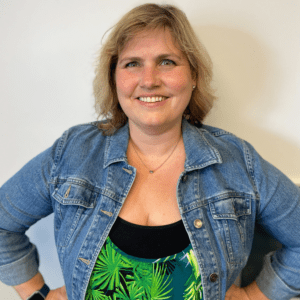
About Paul Giroux:
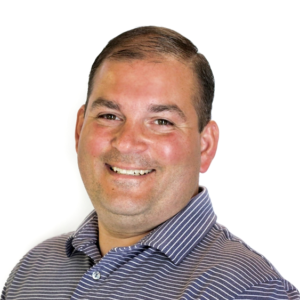
About Christian Galpin:

Check out our blog for more tips for team building and planning the perfect corporate event!
" People often come in with ambivalence and a preconceived notion of what team building is about, and that’s okay. Our goal is to get them engaged in a way that is comfortable for them so that by the end of the event they are raving about how much fun they had and what a unique experience it was."- Shannon DuPont
Get more human resources and leadership advice.
Less drama? Greater teamwork and job satisfaction? TeamBonding is here to help you build a stronger and happier team. Subscribe to get our team building podcast and thought leadership blogs sent straight to your inbox.
